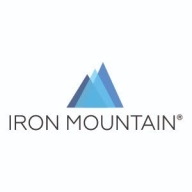

Iron Mountain Connect and AWS Elastic Disaster Recovery are both effective solutions for ensuring business continuity. AWS Elastic Disaster Recovery has the upper hand due to its extensive range of features and high user satisfaction.
Features: Iron Mountain Connect is valued for its reliable data protection, archival features, and secure data storage. AWS Elastic Disaster Recovery stands out with its real-time data replication, automated failover processes, and scalable architecture.
Room for Improvement: Iron Mountain Connect could enhance integration capabilities with third-party tools, improve performance speed, and expand support for various data formats. AWS Elastic Disaster Recovery users suggest enhancements in documentation, more intuitive configurations, and improved cost management features.
Ease of Deployment and Customer Service: Iron Mountain Connect is praised for its ease of use but receives mixed feedback on customer support responsiveness. AWS Elastic Disaster Recovery is recognized for its straightforward deployment process and highly regarded customer service.
Pricing and ROI: Iron Mountain Connect is noted for its cost-effective pricing but has mixed reviews regarding ROI. AWS Elastic Disaster Recovery, although more expensive, is seen as offering better long-term value, justifying its higher price with more immediate and impactful ROI benefits.
| Product | Market Share (%) |
|---|---|
| AWS Elastic Disaster Recovery | 0.7% |
| Iron Mountain Connect | 0.7% |
| Other | 98.6% |
| Company Size | Count |
|---|---|
| Small Business | 5 |
| Midsize Enterprise | 4 |
| Large Enterprise | 11 |
CloudEndure Disaster Recovery enables real-time replication and rapid recovery to enhance organizational resilience. Key features include block-level data replication, ease of use, cost-effectiveness, and automated recovery orchestration. Users benefit from increased efficiency, improved workflows, and enhanced data management, significantly improving organizational performance and business continuity.
We monitor all Backup and Recovery reviews to prevent fraudulent reviews and keep review quality high. We do not post reviews by company employees or direct competitors. We validate each review for authenticity via cross-reference with LinkedIn, and personal follow-up with the reviewer when necessary.